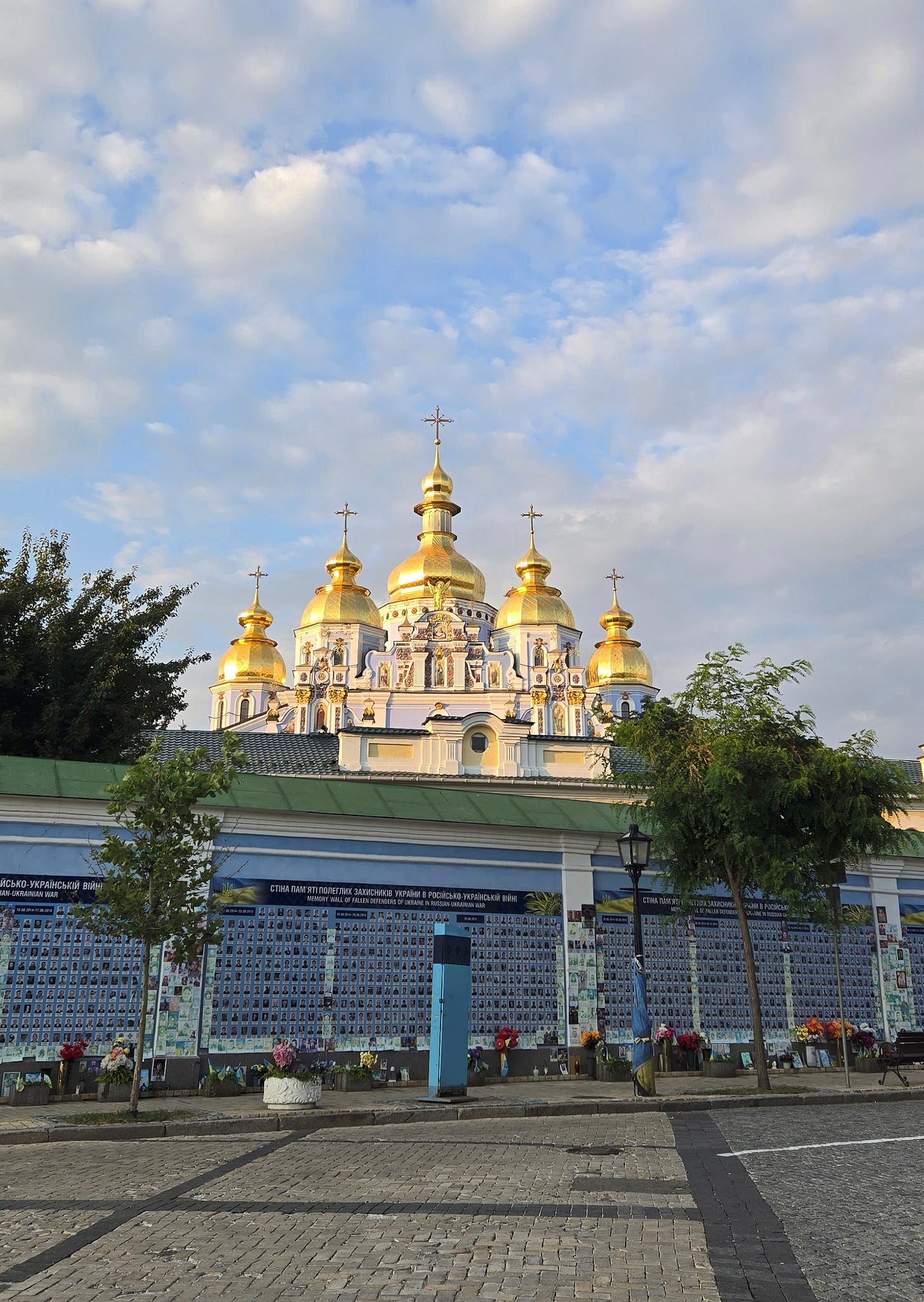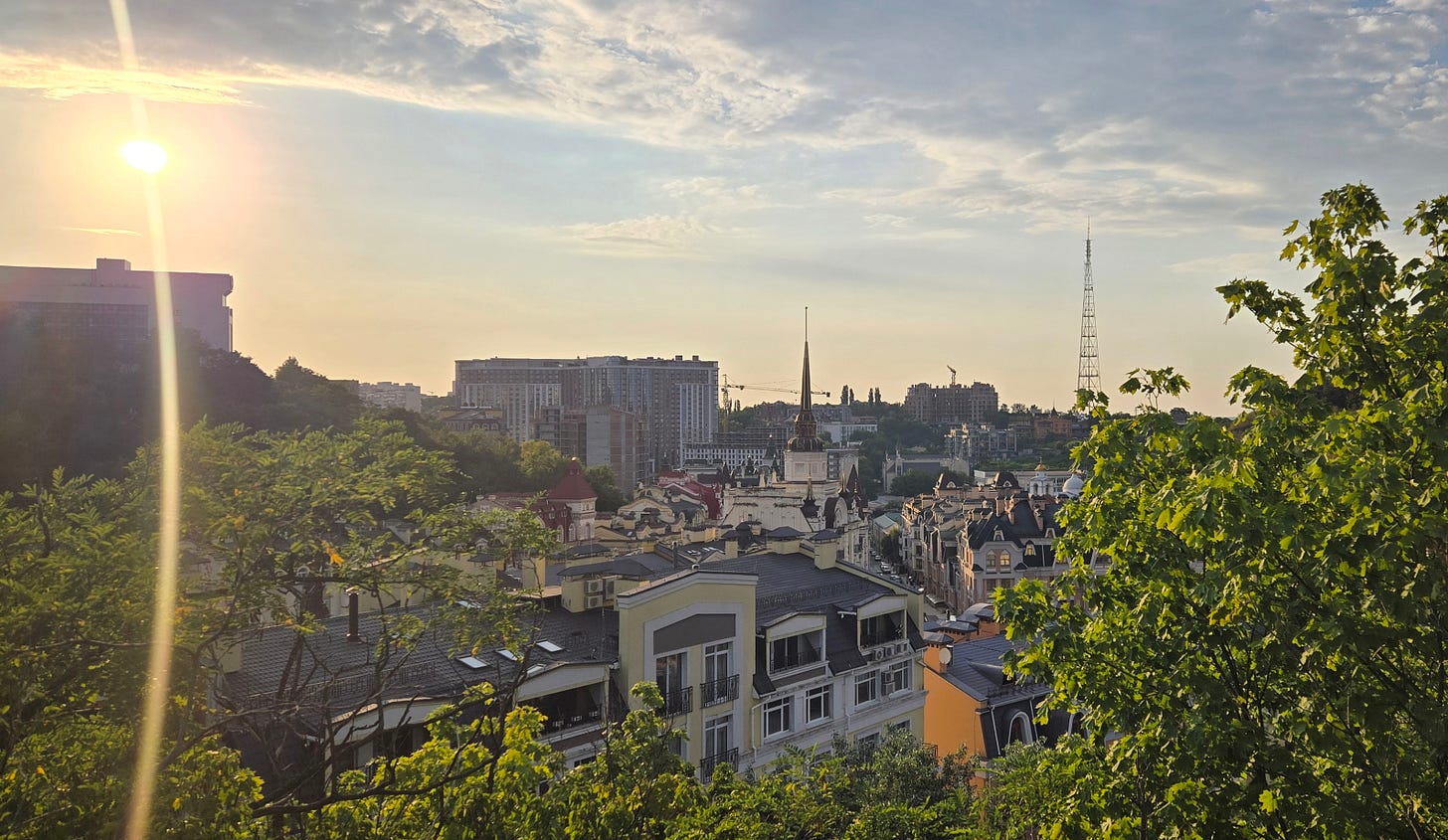Reflections From Kyiv
Some thoughts from my recent trip on cultural resilience, innovation, and legal reforms.
I am back in Poland after a two-week trip to Kyiv. It was my third trip to the Ukrainian capital and probably around my 10th or so trip to Ukraine, although I honestly lost count a while ago.
In one sense, a lot has changed since my first trip in May 2022. The government is operating (from my perspective) pretty efficiently—not many legislatures can pass reforms to get into the EU and prosecute a major war against a former world power amid a revolution in military affairs. In another sense, it’s still the same country with the same resiliency that I encountered three years ago.
I wanted to put together some reflections, particularly around technology, innovation, and reform, but also about some of the broader global issues intersecting Ukraine, and about civil and cultural resilience.
The World is at War
The first couple of nights I sat in my Airbnb wondering if it was safe to dash outside to a shelter. I listened to Iranian Shahed drones and missiles assembled with Chinese parts, probably defended at some point by North Korean troops, descend onto Kyiv. Some of them I saw get shot down from my window.
Coupled with Ukrainian allied support across Europe and other parts of the world, it is hard to characterize this as anything other than a global conflict. Yet, rarely do you find people publicly characterizing it this way. It might not be a “World War” yet, but it is a “world at war.” The sooner allied nations understand this in a way that impacts their military spending and strategic decision-making, the more likely it will be to achieve a quick and decisive outcome.
Culture Resilience
The notion that this is a cultural war is often overlooked in war coverage that focuses on drone strikes and meters of territory gained or lost. Ukraine’s war is a defense of culture as much as a defense of territory. 20,000 Ukrainian children have been kidnapped and removed to Russia. That’s equivalent to about half of the public school population of San Francisco, Seattle, or Washington D.C. Telegram bots push Russian propaganda across the widely used app in Ukraine making their narrative literally inescapable.
The usurpation of Ukrainian culture is a story as old as the Tsar’s empire. From the Russians’ perspective, this isn’t about conquering a sovereign nation; it is about reclaiming a piece of lost territory for their empire. As one of my Ukrainian friends told me, “We’ve been fighting these motherfuckers for 300 years, why would we stop now?”
For an excellent history on the roots of Russian imperialism in Ukraine, I recommend two books by Serhii Plokhy:
Daily life in Kyiv is part of this resistance. Statues have been boarded up and protected against Russian air attacks, and some valuable pieces of art and history have been removed from the country for safekeeping.
Despite the packaging up of monuments and statues to survive bombardments, Kyiv remains one of the most beautiful cities I have ever visited. I’ve not been anywhere in my travels where I could see a church from the 1100s, a 1929 Art Deco apartment building, and a Soviet brutalist government building, all in the same frame. Dilapidated buildings, either abandoned before the war or bombed out, are covered with a canvas façade. Posters, murals, outdoor events, and gathering areas are all over the city. It’s an amazing city to visit. Kyiv looks good.
These are important lessons in civil resilience. It’s easy for a cynic to walk around Kyiv and wonder why resources are spent on things like public spaces when the money could be spent directly on the war effort. It isn’t an either-or. The well-being and morale of the citizenry is the war effort.
In a democracy, people need to support a war, to know that they are fighting to protect something valuable and meaningful. The recent protests in Kyiv and then the government’s response are an excellent example of an active population in combat as well as civic life.1 In any society, morale and endurance matter. Just as you need to ensure your troops get adequate rest to be sharp for the fight, you also need to understand that the civilian population’s endurance levels require the same attention.
Legal Innovation and Reform
A department head on my last ship once suggested, “Whatever admin and meetings we would stop doing if we went to war, we should stop doing them now.” No one likes paperwork. I doubt combat makes it any more enjoyable. Yet, aside from having to learn and adapt strategically and militarily, Ukraine is also pushing through reforms in a way that should make the bureaucratically bloated EU and utterly dysfunctional U.S. legislature reflect. A couple highlights of their reform process:
Ukraine is actively legislating to align with the EU, a requirement for joining. This process is onerous. If the EU changes its regulatory regime, Ukraine must follow suit, regardless of how recent their last reforms were.
Despite this frustrating process, one EU representative told me as they outlined the problems facing Ukraine that Ukraine’s admission into the EU at this point is “irreversible.”
Ukraine created special legal and tax frameworks for tech and defense businesses, allowing a more conducive infrastructure for companies to grow and scale production.
A number of draft laws are circulating government agencies aimed at incentivizing private industry to work with the national government and protect entrepreneurs’ (including innovative soldiers) IP.
The Human Advantage
Here are some updates on Ukrainian IP developments and thoughts about how Ukraine’s expertise will spread after the war.
Ukraine is seeking ways to compensate soldiers for their frontline innovations, either through royalties or lump sum payments. While the government would probably own the IP, this would be a truly novel approach to military innovation.
Patents are problematic in Ukraine for several reasons, including government capture, inadequate legal enforcement, and tax regimes. This is part of the reason for the significant push for the reforms mentioned above, and it will likely be successful given the EU accession process and the increase in FDI interest.
Patents are a problem globally because they take so long to acquire. It is not hyperbolic to say that 3 months of innovation in Ukraine is worth about a year of R&D in the United States. Why patent something when it is obsolete before the ink dries on the application?
Trade secrets—which could protect innovation that was either unpatentable or that the inventor did not want to publicize—are also not conducive to the knowledge-sharing environment that is crucial to wartime innovation. There may be a financial incentive to hold your invention close to the chest, but there is a life-or-death incentive not to. This means a company’s financial well being (read, ability to scale and produce more drones) is stunted in ways companies in other sectors and other nations are not.
A royalty-based or lump-sum payment, especially to soldiers, is probably good policy. It allows the government to acquire and distribute useful innovations and may keep soldiers happy with a little extra cash.
Restrictive licensing is another regime that could be beneficial. The government could grant itself and Ukrainian-based companies a license to use the innovation inside Ukraine, but the soldier or entrepreneur has the exclusive rights to sell the innovation outside the borders.
The upshot of all of this is that what is essential in the Ukrainian innovation ecosystem isn’t so much the patents, but the human capital. Humans are innovating outside of a conducive IP protection regime, but also at a pace that makes traditional IP regimes obsolete.
When export controls are lifted, Ukraine is going to have an advantage over every drone manufacturer in the world because their gear is cheap and has been proven to kill the enemy. They will also have a massive informational advantage in building and using drones, and this knowledge should command a premium. If other countries want to catch up, they should plan to invest a significant amount of money to hire and retain Ukrainian talent.
Thoughts on news from the Rest of the World
‣Drone Dominance
My trip coincided with a significant amount of news related to Ukraine. The Hegseth memo on drones and a potential “Ukrainian-drones-for-US-Patriot-Missiles” were the big ones. I’m not going to rehash the Hegseth memo here, but I recommend those interested read this CSIS piece on what the U.S. can learn from Ukraine to “Unleash U.S. Military Drone Dominance” and my friend and business partner Jesse’s analysis on the memo.
‣Where Ukraine succeeds, the EU flounders
In trying to support startups across all sectors (which would undoubtedly help the defense sector the EU is trying to cultivate) the EU Commission had a plan to make a singular legal infrastructure for startups—allowing them to scale without having to navigate 27 different regulatory regimes. This unified regime is in jeopardy for various political reasons and its failure will be catastrophic for a unified European innovative defense-tech market.
‣Applying Differences to Lessons Learned from Ukraine
I have a friend (American) building drones in Ukraine, and one of the things we discussed is how decentralized yet effective the Ukrainian drone industrial base is. This was my experience as well when I toured drone factories: You go to a nondescript location outside a city that looks like an abandoned sawmill, and then, when you walk through the rusted sheet-metal doors, you find yourself in a highly sophisticated drone-making operation.
These are impressive operations, but it is essential to understand what distinguishes Ukraine from the U.S. and our allies when considering the next war, such as a potential conflict with China.
The Ukraine method may be useful for forward-deployed U.S. troops, Australia, and East-Asian allies dealing with sporadic or potentially non-existent supply chains, but the ability for the U.S. to retool and centralize production if required should not be ignored.
Decentralization needs to come with deconfliction. Up to 60% of Ukrainian drones are downed through "Electronic Warfare friendly fire." Deconflicting the EW space will be critical to militaries engaged in complex and coordinated, multi-branch, multi-domain operations.
‣Soft Power Fallout
One member from a European Union delegation told me that the fallout from the shuttering of USAID is not known and probably will not be known for a while. “Americans could move money and resources quickly to the small and medium-sized organizations that did some really good work.” No one can move capital as quickly or efficiently as Americans. This observation, unfortunately, aligns with a complete withdrawal of soft power from the Pacific region, where the U.S. has been described as “a disinterested and mercurial partner.” Having friends throughout the world matters—American soldiers and sailors may need a favor on a far-off Micronesian island one day.
Some Final Thoughts
At some point, the war will end. Just as politics changed on day one of the war, they will change again on day one of the peace. I wonder how much time the Ukrainian government is devoting to post-war planning. Compare World War II with Iraq: it matters, despite how premature it may seem.
As much as I wish there were a flood of FDI right now, I know the reality of the risk-averse private sector is that the spigot will turn on after a peace agreement is signed. I wonder if Ukraine will be able to regulate foreign investment in a way that is beneficial to Ukraine and supports a sustainable democracy.
I spent a lot of time thinking about what it will be like when the soldiers return from the east and the refugees return from the west. After one of the bombardments ended, I sat in my flat wondering if I could hear a Shahed or not—or perhaps it was just the AC or refrigerator. After 3+ years of drone attacks, people coming back from combat are going to have a whole new manifestation of PTSD the world has not seen.
I wonder if Russian sanctions will turn off and if the world will allow them to reset their economy as if nothing had happened. I doubt the world has the stomach for a Treaty of Versailles or even a Nuremberg, given that it doesn’t even have the stomach for increasing sanctions to a level that would reduce Russia’s wartime economic capacity.
What I have seen over the last three years is a nation and its people who are not just brave and resilient, but also adaptive and responsive: to their government, to their enemies, and to mercurial diplomatic relationships. I have faith that the Ukrainians will make the right choices and that their decisions will be their own, free, and self-determining.
It is difficult to at one time paint the picture of a resilient democracy while protests around recent government moves to dismantle anti-corrpution efforts are developing as I try to hit the “send” button on this post. I don’t think this changes my calculation at all, however. For one, I am not well versed enough in Ukraine domestic politics or the extent of Russian infilitration to really grasp if this was the right move or not.
Second, only time will tell if President Zelenskyy will back off these recent moves. Democarcy is messy and requires constant upkeep. Whether or not these protests and moves by Zelenskyy amount to a permanent “backsliding” is up to the Ukrainians—as it should be. For some additional material on this evolving story:





